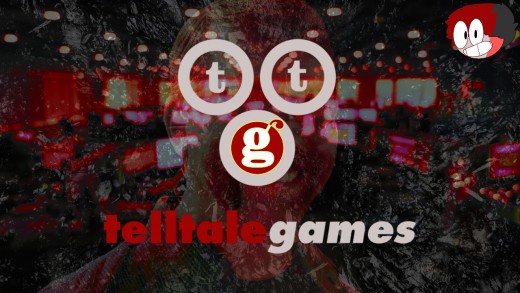The Tragedy of TellTale: Bruner’s Brutality
The Tragedy of TellTale: Bruner’s Brutality

Why Kevin Bruner Killed His Company
I used to have a lot of respect for TellTale. I respected them for their amazing adaptation of The Walking Dead in game form, especially for their art style, spectacular storytelling, and likeable characters, in a choose-your-own adventure style. Although I still find these games to be shear masterpieces, I’m very disappointed to know the horrific management behind what I thought to be a game company with good intentions.
TellTale started out as a passion project in 2005, created by 3 guys: Kevin Bruner, Dan Connors and Troy Molander, who all used to work at LucasArts’s adventure game division. Over the next 7 years, TellTale received several licenses from LucasArts, as well as other companies like Ubisoft, to creative episodic adventure games, starting off with the likes of Sam and Max, Wallace and Gromit, & Monkey Island. They then expanded to gain bigger licenses beginning in 2010, such as Back to the Future, Jurassic Park, Law & Order, and the one that they’re most well known for: The Walking Dead.
During 2012, the staff at TellTale were just a tiny group of people who had a mutual trust with each other. No one felt left out or forgotten about in the work force, and everyone had their set assignments. Management wasn’t hovering over them, which meant developers had breathing room to work.
Since the first walking dead game blew up in the same year however, Co-founder Kevin Bruner, became more aggressive ever since the lead developers, Jake Rodkin and Sean Vanaman, got praise for most the work on the game, when in Bruner’s mind, since it was his company, he should have gotten more praise for it. Due to this entitlement mentality, this led to a negative ripple effect throughout the studio, especially with acts of micromanagement.
For the next 5 years, communication severely lacked between employees. Not only that, but to keep up with management’s specific ambitions, they had to shift developers in and out of different projects and when people started complaining about this, the company just decided to add more people as an attempt to remedy the situation. This didn’t fix the problem and led to employee burnout, especially during “crunch time”, which meant that the game deadline was just a few months away.
While TellTale literally offered unlimited time off from work, employees often felt like they couldn’t because that would mean pushing more work to other people, even though everyone was always working insanely hard already, sometimes stretching up to 20 hours a day. Not only were they getting underpaid for this overtime, but Bruner’s ownership mindset was so intense, that one former employee responded to The Verge, a technological news network hosted in the United States, in an interview with this statement: “It often felt like we were building games specifically for him. We were tailoring the type of content we were building — not just game-play mechanics, but tone, the types of characters we chose to use — to his taste. This was one of the biggest issues with him as a CEO: he was pretty convinced that his taste was everyone’s taste.”
Since Bruner became the CEO in 2015, everyone at TellTale couldn’t discredit Bruner’s positive aspects with the company, but weren’t blind to his mostly negative side. He did have skills in programming and a reputation for having good gut instincts, which did benefit the company. However, he always had the problem of expressing his thoughts in a very non-respectful way towards employees, which did not benefit anyone but himself.
Early in 2017, not only did 8 key employees in the creative process leave, but the lead developers Rodkin and Vanaman as well, which really impacted the rest of the team who noticed the effort and dedication of those specific people, and led some other employees to quit as well.
Eventually, Bruner left in March of 2017. This led to Dan Connors, one of the executive producers at TellTale, becoming the new CEO, which meant a lot of the tension in the company that was built by Bruner was easing. This made employees feel as if they were no longer creatively caged, since the micromanagement had ceased. In September, Pete Hawley, formerly the executive from Zynga, became the new CEO, which led to employees’ guards being up once again.
Then in November, the company fired a quarter of it’s staff, which included new members as well as the creative veterans of TellTale. Even though this tragedy occurred, the staff were paid for the remaining months, as well as participating in a job fair that the company hosted to help their employees. The rest of the staff even got the day off to spend time with the last day workers.
At the beginning of 2018, things were starting to look up. Although the current staff felt saddened, they were optimistic about TellTale’s future. Workers had more creative freedom, meetings with staff about projects were now constructive, and the working environment was less stressful. Many projects were lined up for 2018 due to the multiple licenses they’ve received, and everyone was excited for a bright future that hopefully consisted of giving the fans what they wanted.
However, in February of 2018, Bruner bit back TellTale with a lawsuit. Bruner claimed that TellTale owed him for “breach of contract”. He also stated that the TellTale higher-ups had been looking to replace him in order to fix the inner workings of the company. TellTale replied that Bruner’s statement had no merit, and that Bruner used to work for TellTale while it was spiraling downward.
1 month later, The Verge dropped a very extensive analytical article exposing TellTale for it’s sins. It contained sources from ex-employees of TellTale that uncovered the dirt on not only Kevin Bruner, but the inner workings of how the staff were treated. This, of course, did not put the company in a very good light publicly.
On August 14th, 2018, the first episode of The Walking Dead: The Final Season was public. Not just that, but on twitter, TellTale gave all the release dates to the rest of the episodes. Although an unusual feat done by the company, my guess is that it was for possible hype since this was going to be the end of a series that blew them up in the first place, and they wanted to send it off with a bang.
And it did go off with a bang…at the expense of the company’s death on September 21st. One tweet by TellTale announced that not only their staff had been cut down to 25 people to finish current projects, but that it would be shutting it’s doors. Although they received a lot of positive feedback earlier this year, it didn’t translate well in sales, hence the preparation for shut down.
Literally 1 day before, two companies that were working with TellTale in order to give the company more funds for future projects, AMC and Smilegate, decided to cancel their negotiations. It was not clear why they both halted it on the same day, but nonetheless, this occurred shear hours before the 21st. This was absolutely devastating for TellTale because their last investor was no longer sustaining them, and for the most part, the company was barely running off of sales and was low on money at this point due to low return on it’s games.
The next day, a post was made by Bruner on his personal blog titled: “Telltale closure”. This post contained Bruner stating how his creative differences with the board led him to leave the company, his passion for the company despite his specific creative vision clashing with others, the thankfulness he had for his fellow employees, as well as his sympathy to the people who lost their jobs.
And that’s the other devastating factor to this…how the people who lost their jobs were handled in this terrible situation. In November of last year, the staff who were laid off had severance pay and got to spend time with their fellow employees for their last day…but September 21st was a completely different story: They got 1 check for the day, had to leave in 30 minutes, got no severance pay, and their health care only lasted 9 more days which was till the end of the month.
3 days later, a former employee sued TellTale for not getting his wages and specific benefits that the company said came with the job, and to also claim that for everyone else who was laid off. He claimed that it violated the state’s “WARN Act”, which means that the company has to let an employee know 60 days ahead of time with a written notice about any massive layoffs…which TellTale didn’t. TellTale refuted this with saying that the WARN Act contained a clause about “unforeseeable business circumstances”, which would have worked if that clause was in the that state’s WARN Act.
The fact that these employees got mistreated for so long is inexcusable and and downright demeaning. This is what happens when you treat employees as if they’re just cogs in a machine, and not mortal beings with emotions, brains, and lives outside of the office. It truly saddens me that this occurred, especially since it led to the demise of a company who made games that I loved…
Besides the fact that Skybound jumped in to help them finish The Final Season of The Walking Dead game…TellTale is dead. It died due to bad management, inhumane expectations of employees, & stifling the creativity of everyone, which led to less sales due to the company’s reputation of producing the “same game” every time, all because of one man’s egotistical entitlement.








